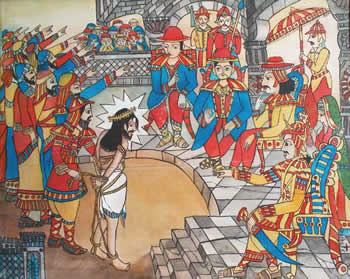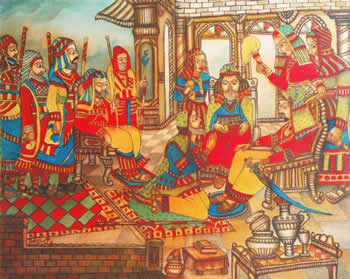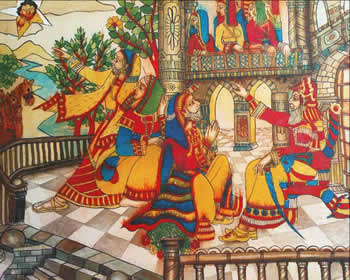From Our Archives
Debie Thomas, What is Truth? (2021); Debie Thomas, The King of Truth (2018).
This Week's Essay
John 18:37, "Yes, I am a king."
For Sunday November 24, 2024
Lectionary Readings (Revised Common Lectionary, Year B)
Psalm 132:1–12, (13–18) or Psalm 93
Revelation 1:4b–8
John 18:33–37
Christmas is coming. Our little shopping plaza is decked out in holiday lights. It's been twenty-eight weeks of "ordinary time" since the church celebrated Pentecost on May 19, and next Sunday December 1 we pivot to a new liturgical year with the sacred season of Advent. But not yet. We have one more piece of business on this last Sunday of the old year.
In the wake of the American presidential election, this week we celebrate "Christ the King." Such explicitly political language makes many Christians understandably nervous. Isn't this a setup for liturgical failure, or maybe political catastrophe — witness the virulent Christian Nationalism in parts of the United States.
Religious language about kingship can feel outmoded, offensive, and triumphalist. For most of the world that doesn't live under monarchs, it's also irrelevant. We're rightly repulsed at how the reigns of kings have often meant a reign of terror for many subjects — massive wealth and power accumulated by cruelty and exploitation, which religion then justified as a "divine right," and which was then passed on by birthright to people who did nothing to deserve it.
That's an important point well taken. Nonetheless, the language of kingship is deeply embedded in the New Testament. Unless you want to follow Thomas Jefferson and erase the parts of the Bible that you don't like — thus creating a Bible in your own image, we're left with the language of kingship. As in a game of cards, we're better off to play the hand we're dealt. The question is, what does the kingship of Jesus mean?
 |
|
Jesus Before Pilate.
|
Jesus himself, his first followers, and most notably his detractors, all used the language of kingship to describe who he was and what he did. People remembered Jesus in various ways. He was a carpenter. He was a healer and a miracle worker. A teacher. A renegade rabbi who broke purity laws. He was a prophet who defended the vulnerable and the outcasts. He was a shepherd, as we see in the earliest Christian art. He also claimed to be a king with a kingdom.
John 18 for this week records the most dramatic political confrontation in the gospels, and it's a perfect reminder for our own political moment — Pontius Pilate's interrogation of Jesus in the praetorium, his three-fold declaration that he found him innocent, then his death sentence verdict to pacify the mob, mock the Jews, and protect his job. For John, the passion narrative in general and the trial before Pilate in particular were political crises. Jesus's trial and Roman execution culminated a clash between two kings and two kingdoms, and the allegiance that they both solicit from us.
When we begin Advent next week, lowly Mary's Magnificat will celebrate how the birth of Jesus signaled that God would "bring down rulers from their thrones." In Mark's gospel, the very first words spoken by Jesus announced that "the kingdom of God is at hand." In Matthew, the Persian magi inquire about "the king of the Jews." In Luke, Jesus was dragged before Pilate for three political charges: "We found this fellow subverting the nation, opposing payment of taxes to Caesar, and saying that He Himself is Christ, a King."
Jesus threatened the political powers, not because he sought to control what they controlled, says the historian Garry Wills, but because "he undercut its pretensions and claims to supremacy" with his alternate kingdom. The earliest Christian confession that "Jesus is Lord" was inherently seditious, as was the prayer "thy kingdom come."
The Yale historian Jaroslav Pelikan observed that pagans accused the earliest believers of sedition because of the overt political implications of this confession of a "kingdom of God" and a "citizenship in heaven." Confessing Jesus as Lord meant rejecting the supremacy of Caesar. Loyalty to Christ the king was absolute and unconditional, whereas fidelity to the Roman state was relative and conditional.
In apocalyptic dreams and visions, this week's Old Testament reading from Daniel traces the rise and fall of the political kingdoms of his age — Babylon, Persia under Cyrus the Great, Greece under Alexander the Great, and then Rome. Unlike these human kingdoms, Daniel imagines a kingdom that isn't temporally limited; it's "an everlasting dominion that will not pass away, and will never be destroyed."
 |
|
King Augustus.
|
And what's unlimited in time is also unlimited in space. This isn't an ethnocentric kingdom that's restricted to one land and one people. The kingdom of God announced by Jesus welcomes "all peoples, nations and people of every language" to worship the one true "ruler of the kings of the earth" (Daniel 7:14–15; Revelation 1:5).
The creative alternative of the kingdom of God that Jesus announced and embodied is what life would be like on earth, here and now, if God were king and the rulers of this world were not (Borg, Crossan).
The political, economic, and social subversions would be almost endless — peace making instead of war mongering, liberation not exploitation, sacrifice rather than subjugation, mercy and not vengeance, care for the vulnerable instead of privileges for the powerful, generosity instead of greed, humility rather than hubris, and inclusion rather than exclusion.
The relationship between my pledges of allegiance to both church and state is thus inherently awkward and ambiguous. There's no timeless blueprint in Scripture. There's a thin line between patriotism and nationalism, We should reject binary ways of black and white thinking about this subject, in favor of the many shades of gray that we find in both Scripture and history. Consider the following ten or so different nuances.
In 2 Samuel 5, David is anointed as God's elect king. But Isaiah also described the pagan king Cyrus as God's "elect" servant, which means that God is just as present in the tragedy of exile as in the miracle of exodus.
Paul advises believers to "submit to the governing authorities." Peter tells us to "honor the king." So, sometimes believers co-operate with the state.
But other rulers — Pharaoh, Nebuchadnezzar, Herod, Nero, Mao and many others — persecuted God's people. John portrays Rome as a terrifying Dragon and the whore of Babylon who devours the saints. Thus, at other times, believers subvert rather than submit to state powers, we confront rather than co-operate, as under Nazi Germany and South African apartheid.
For the first three hundred years, believers were an invisible and insignificant minority of Rome's 60 million people. They were inconspicuous and non-confrontational. Flying under the radar was safe, but it also risked cultural irrelevance.
 |
|
The King Herod.
|
Later, the state persecuted the church, although some historians now argue that persecution wasn't as severe as often thought. Perhaps it was more local and sporadic than systematic. Nonetheless, by the fourth century the church had its own calendar of martyrs. After the martyrs, the ascetics fled to the desert and spurned authority, both sacred and secular.
There eventually emerged a profound paradox. Having persecuted the church, Rome became its protector, and the seat of the papacy. When Constantine legalized Christianity, the church enjoyed privileges like tax exemptions, spectacular state-funded basilicas, and the return of confiscated property. But when co-operation is beneficial, compliance and conformity are temptations.
In the late Middle Ages, the church acted like a state. Garry Wills writes, "Popes launched crusades in the Holy Land and Spain, backed inquisitions, empowered mendicant orders, anointed kings, and put whole countries under interdict."
Today we cherish the separation of church and state, which separation includes religious pluralism. This is one of the best reasons to celebrate the 4th of July: "Until the ratification of the First Amendment of the Constitution of the United States," writes Wills, "it was unheard of for a state to be without an official religion."
So, however complicated, however aspirational rather than actual, and despite our egregious subversions and failures, the invitation and the challenge remain: "Seek ye first the kingdom of God."
Weekly Prayer
St. Theodulph of Orleans (760–821)
All glory, laud and honor,
To Thee, Redeemer, King,
To Whom the lips of children
Made sweet hosannas ring.Thou art the King of Israel,
Thou David's royal Son,
Who in the Lord's Name comest,
The King and Bless'd One.The company of angels
Are praising Thee on High,
And we, with all creation,
In chorus make reply.The people of the Hebrews
With palms before Thee went;
Our prayer and praise and anthems
Before Thee we present.To Thee, before Thy passion,
They sang their hymns of praise;
To Thee, now high exalted,
Our melody we raise.Thou didst accept their praises;
Accept the prayers we bring,
Who in all good delightest,
Thou good and gracious King.From http://songsandhymns.org/people/detail/theodulph_of_orleans:
St. Theodulph of Orleans was born in Italy or Spain, around 760 A.D. to a family of nobility. He chose a life of religious service and became abbot of a monastery in Florence, Italy. In 781, Charlemagne appointed him Bishop of Orleans, France. However, when Charlemagne died, his son, Louis the Pious, suspected Theodulph of treason, and he was imprisoned in Angiers in 818. While imprisoned for conspiring against the King of France, St. Theodulph of Orleans wrote the verses that give us the Palm Sunday hymn "All Glory, Laud, and Honor." He died in prison.
Dan Clendenin: dan@journeywithjesus.net
Image credits: (1–3) Bhanu Dudhat, Dudhat Art Gallery.





